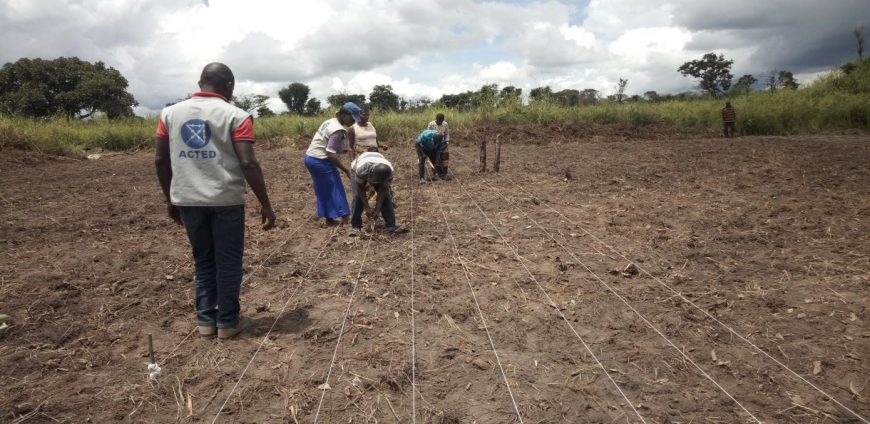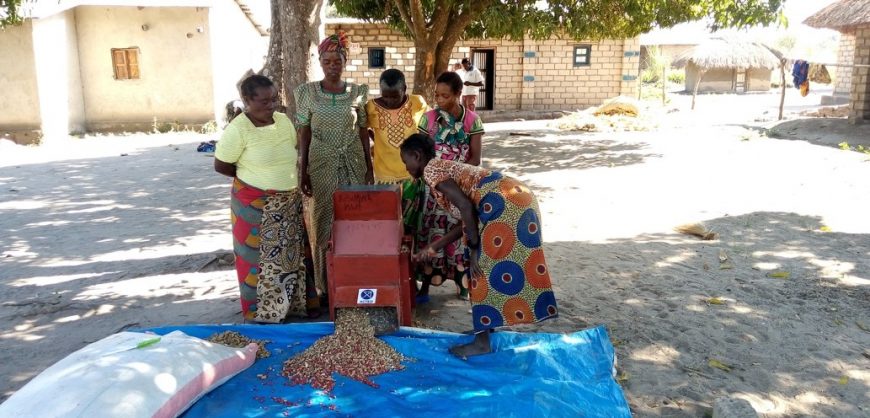The ongoing conflict in Tanganyika continues to deeply impact southeast Democratic Republic of Congo (DRC), having caused thousands of casualties since 2013. In the neighboring province of Haut-Katanga, the territory of Pweto also hasn’t been able to escape the devastating effects of this crisis.
Hundreds of people have fled their villages, leaving all their belongings behind. For those who chose to return, everything had to be rebuilt.
In order to assist the most vulnerable individuals who chose to return to Pweto, ACTED has set up cash distributions, food fairs, and agricultural revival activities to ensure the families’ well-being.
Restarting agricultural activities: a key step for a sustainable return to conflict-affected areas
Many of those who chose to return to their villages in Pweto found themselves completely destitute. Villages were ransacked, houses were burned, and land properties were completely destroyed. Families had to rebuild everything. In an effort to help, ACTED provided cash distributions to nearly 1,100 families, and organized food fairs allowing 8,000 families to stock up on food.
But in order to provide more long-term assistance, ACTED has also implemented several income-generating activities, as a means to reduce the need for families to recurrently rely on external assistance. With the support of the Humanitarian Fund for the DRC, these activities primarily include agricultural revival projects.
Aligning theory and practice for agricultural trainings
Prior to the ongoing conflicts, many families living in the villages of Pweto earned their livings through agricultural activities. Farmers sold produce in the villages, keeping any surplus to provide for their own families. But when they returned to Pweto, they found that their crops had been completely destroyed.
Consequently, ACTED has offered training sessions to local farmers in order to reboot agricultural activities in the area. The sessions covered various informational practices, such as cultivation and market gardening techniques; stock management, and proper food storage.
To combine theory with practice, ACTED has also established eleven training sessions, which serve as a learning tool for sustainable agricultural techniques. These techniques are based on natural and traditional methods of seed protection, such as seed drying or the use of ashes as bio-pesticides and fungicides. Beneficiary farmers can consequently utilize this information in their own fields.
Working together toward sustainability
In a context marked by severe conflict; this training activity was also an opportunity to bring people together, strengthening social cohesion and community solidarity.
At the end of the training, 100 families were provided with food kits containing maize, groundnut, and eggplant seeds, as well as essential agricultural equipment such as hoes, rakes, and seed packaging bags.
After participating in the trainings, Martin, a resident of the village of Kapondo, was appointed by his community to manage the food committee of his village. Today, within his role in the committee, he accompanies farmers in their activities in their fields, in a personalized manner adapted to every individual. This peer-to-peer learning method allows for best practices to be passed on as widely as possible.
Including Women in Agricultural Practices
Today, the trainings are beginning to bear fruit, as families are starting to earn profit from their crops again. In order to facilitate the marketing stage, ACTED has focused on the processing and conservation of agricultural products. In order to do so, the NGO has set up 8 groups dedicated to this activity, and provided them with the necessary tools and equipment. These groups are mainly composed of village women, an approach that will allow them to develop their own activity and gain financial independence.


